RIO DE JANEIRO, BRAZIL – On Thursday, June 23, the Central Bank of Mexico (Banxico) raised its interest rate by 75 basis points to 7.75% to attenuate inflation at a two-decade high and anticipated that it could continue to increase it if necessary.
“The Board of Governors intends to continue increasing the reference rate and will consider acting with the same forcefulness in case it is required,” said the statement issued by the institution, whose board of directors made the decision unanimously.
Analysts highlighted that the rate increase -the ninth in a row- is the most aggressive since Banxico adopted the interest rate as its operational target in 2008.

“It had never made a rate increase of more than 50 basis points,” noted Gabriela Siller, director of analysis at local bank BASE, in a report to clients.
Banxico’s decision, which was already anticipated by the markets, has as an immediate antecedent the rate hike of the same magnitude that the US Federal Reserve implemented last week.
The local monetary authority also considered Mexico’s most recent inflation data, which reached an annual rate of 7.88% up to the first half of June, a figure without precedent since 2001.
Banxico’s inflation target is an annual rate of 3%, +/- one percentage point.
“Higher-than-anticipated” inflationary pressures led the Board of Governors to revise its price forecasts upward through the third quarter of 2023.
However, “convergence to the 3% target is still expected to be reached in the first quarter of 2024,” the institution added.
It also explained that inflation might be further impacted by the increase in prices of agricultural and energy products due to the war between Russia and Ukraine, the coronavirus pandemic, and a peso depreciation against the dollar.
He added that prices could moderate in the future if the intensity of the war decreases and the functioning of global supply chains improves.
With information from AFP

